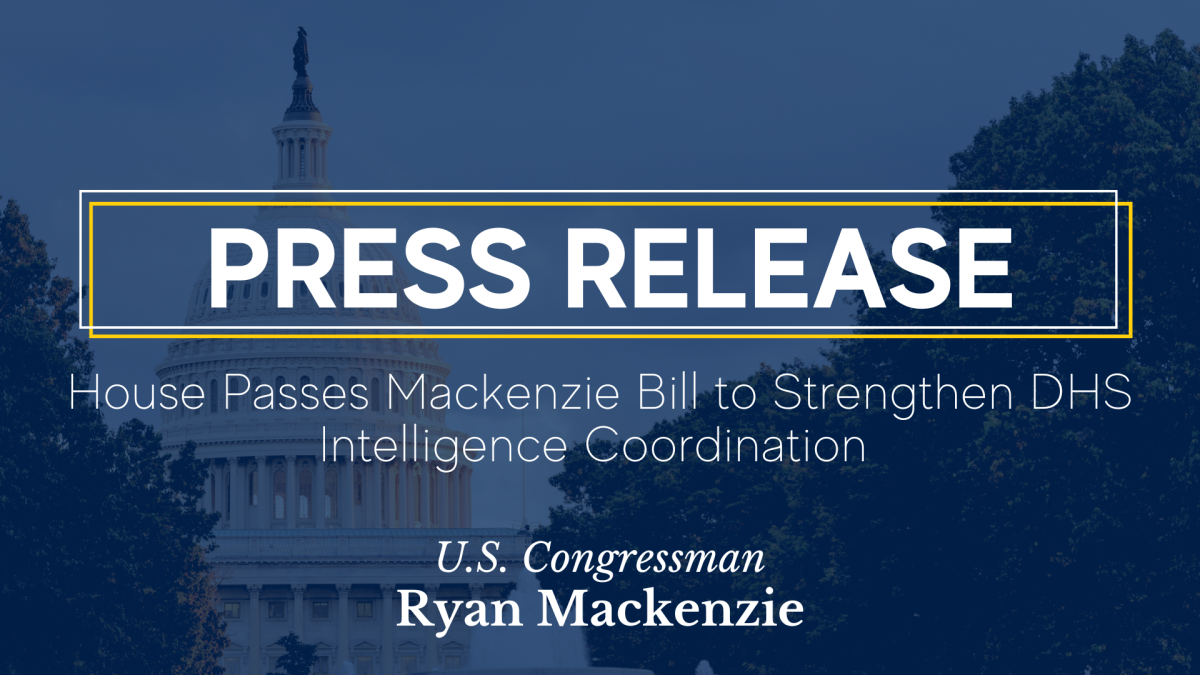House Passes Mackenzie Bill to Strengthen DHS Intelligence Coordination

Washington, D.C. — Yesterday, the U.S. House of Representatives passed Congressman Ryan Mackenzie's (PA-07) legislation, H.R.2212, the DHS Intelligence Rotational Assignment Program. The legislation requires analysts within the Department of Homeland Security’s Office of Intelligence and Analysis (I&A) to participate in the Office of the Director of National Intelligence’s Civilian Joint Duty Program — improving coordination, enhancing information-sharing, and strengthening support for law enforcement partners. The bill passed unanimously in both committee and on the House floor. Congressman Mackenzie, who serves on the House Committee on Homeland Security, first introduced the bill in March of this year.
“Information-sharing is one of the most important tools we have to protect Americans, and it’s essential that we prioritize it throughout the Department of Homeland Security,” said Congressman Mackenzie. “At workplaces across the country, rotational experience builds stronger teams, breaks down silos, and improves performance. Earlier in my career, serving on the Pennsylvania Workforce Development Board and as Republican Chair of the Pennsylvania House Labor and Industry Committee, I saw firsthand how programs like this strengthen communication, build institutional knowledge, and help organizations achieve their mission. Applying that same model here will give DHS analysts broader experience across the intelligence community so they can better support law enforcement, respond to emerging risks, and help keep our country safe.”
“In this rapidly evolving threat environment, I am pleased to support Congressman Mackenzie’s ‘DHS Intelligence Rotational Assignment Program and Law Enforcement Support Act,’ which will enable DHS intelligence analysts to broaden their expertise by gaining experience across different intelligence components. I urge the Senate to pass this legislation to enhance DHS’s information-sharing capacity and deepen coordination across the intelligence community,” said House Homeland Security Committee Chair Garbarino.
A 2017 joint report from the Inspectors General of the Intelligence Community, the Department of Homeland Security, and the Department of Justice identified gaps in DHS intelligence integration, including inconsistent participation in joint training and limited access to systems commonly used across other intelligence agencies. The bill addresses these gaps by requiring DHS components to participate fully in ODNI’s rotational program.
“As a member of the House Homeland Security Committee, I’m glad to see this legislation pass the House,” said Congressman Mackenzie. “This commonsense reform strengthens coordination across agencies and ensures DHS analysts have the tools and experience needed to support the mission.”
The bill now moves to the U.S. Senate for further consideration.
Bill text is available here.
See the Congressman’s remarks here.
###